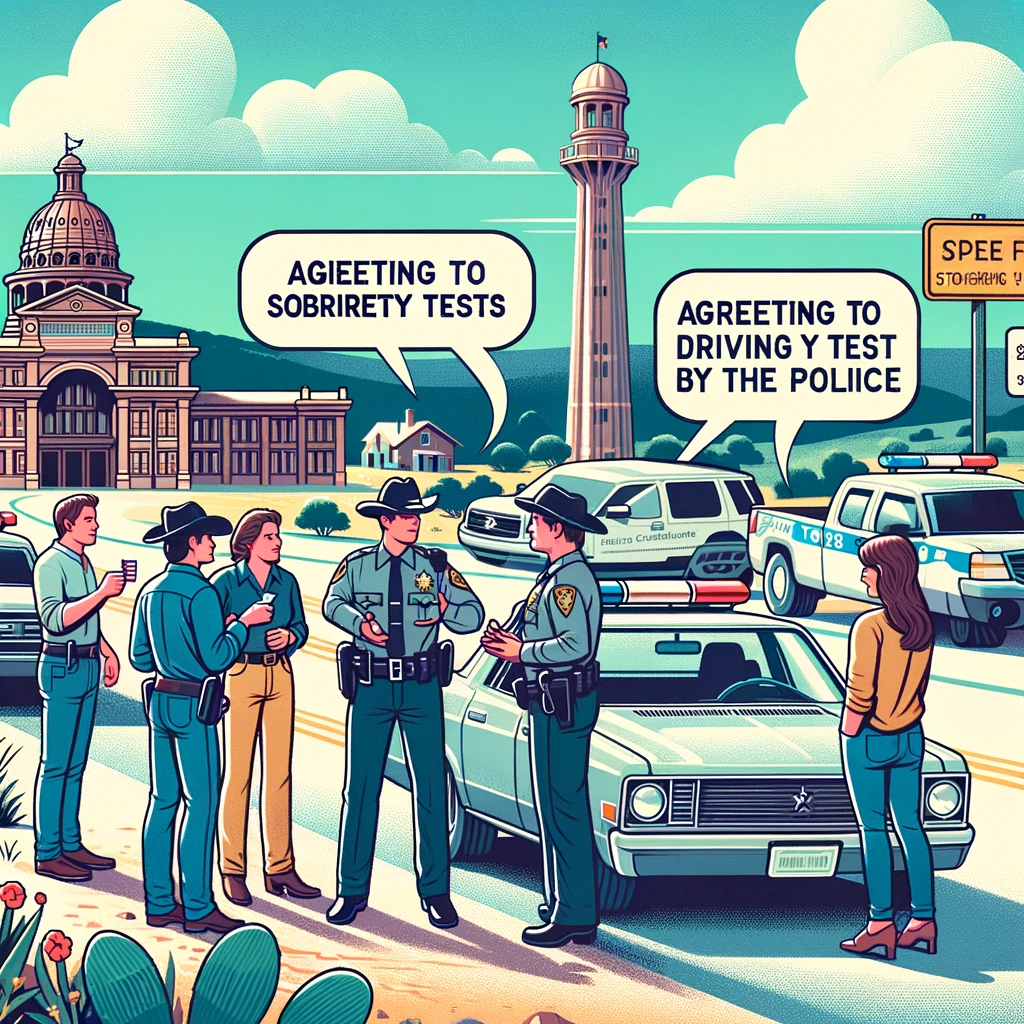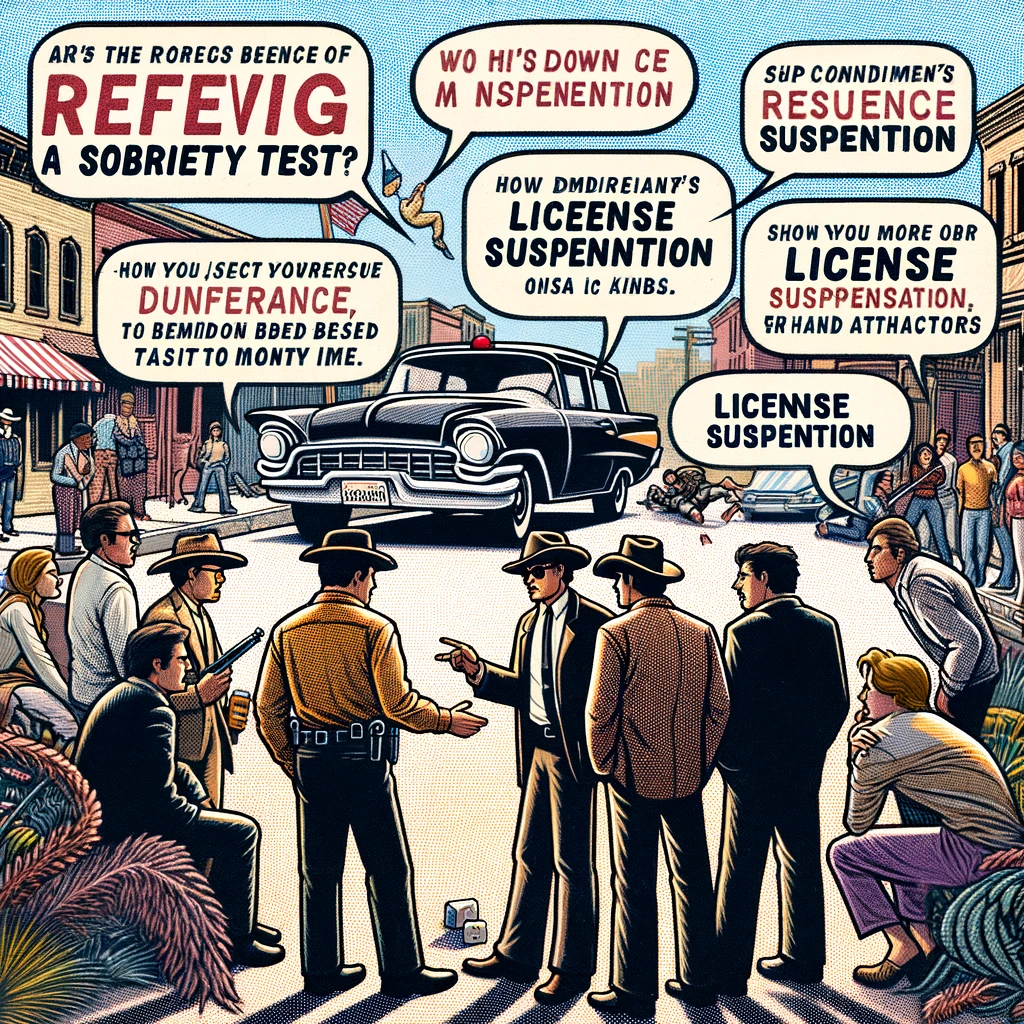
Navigating the complexities ofimplied consent laws in Texas requires a comprehensive understanding. As you drive in Texas, it’s imperative to grasp these legal frameworks. Today, we dissect the multifaceted nature of Texas’s implied consent laws, offering clarity and depth. We’re delving into a driver’s guide to Texas Implied Consent Laws.
Navigating Roads and Rules with a driver’s guide to Texas Implied Consent Laws
Imagine cruising down a Texas highway, wind in your hair, music blaring. Pure bliss, right? But wait! Blue and red lights flash behind you. Your heart races. It’s a situation many Texans face, leading to a crash course in implied consent laws.
What are these laws, you ask?
In short, they mean if you drive in Texas, you agree to sobriety tests if stopped. But why stick around for the nitty-gritty? Because knowing these laws can save you from a world of trouble. From avoiding hefty fines to keeping your license, we’ve got you covered.
This blog dives into a driver’s guide to Texas Implied Consent Laws. We’ll unpack what they mean for you, the driver, in everyday terms. So, buckle up and let’s turn this legal journey into an adventure!

Definition and Explanation of Implied Consent Laws
In Texas, driving equals automatic agreement to BAC tests. These laws aim to deter impaired driving, ensuring public safety. Essentially, by holding a Texas driver’s license, you consent to chemical testing when suspected of DUI or DWI.
Historical Context and Legal Background
The journey of implied consent laws in Texas mirrors societal shifts towards road safety. Initially modest, these laws have toughened, reflecting a zero-tolerance stance towards drunk driving. This historical backdrop underpins today’s stringent enforcement and legal expectations.

Comparison with Other States
While Texas shares common ground with other states in combatting DUI/DWI, nuances exist. For instance, Texas’s refusal penalties are notably stringent. This comparison sheds light on Texas’s aggressive stance on impaired driving.
The Role of Implied Consent in DUI/DWI Cases
In the context of DUI/DWI, implied consent is a legal linchpin. Compliance or refusal influences case outcomes significantly. This underscores the laws’ central role in legal proceedings involving impaired driving in Texas.
Penalties and Consequences
Refusing a BAC test triggers concrete legal consequences. In Texas, this often leads to immediate license suspension. Awareness of these repercussions is crucial, as they significantly affect one’s driving privileges and legal standing.
| Action | Consequences in Texas |
| Refusal to take a BAC test | Immediate license suspension |
| First offense of refusal | License suspension up to 180 days |
| Second offense of refusal | License suspension up to 2 years |
| Third offense of refusal | License suspension up to 2 years |
| Driving under influence (DUI) | Fines, possible jail time, license suspension |
Rights and Obligations of Drivers
Drivers should know their rights but must also recognize their legal obligations. Understanding this balance is crucial for navigating encounters with law enforcement. This knowledge empowers drivers, aligning their actions with legal standards.
Procedure for Chemical Testing
The specifics of chemical testing are governed by strict protocols. In Texas, the process includes certain rights for the individual, such as the right to a subsequent independent test. Familiarity with this process can alleviate anxiety and foster compliance.

Legal Defenses and Challenges
Challenging an implied consent violation in Texas demands robust legal strategy. Common defenses include questioning the legality of the stop or the administration of the test. Navigating these defenses requires adept legal expertise.
Impact of Refusal on Driver’s License
The consequences of test refusal extend beyond immediate legal concerns. In Texas, license suspension varies based on refusal history and other factors. Understanding this impact is essential for drivers, influencing decisions during traffic stops.

Advice for Motorists
In light of Texas’s laws, prudent behavior and informed decision-making are paramount. Knowing how to interact with law enforcement can mitigate potential legal issues. This advice is invaluable, equipping drivers to handle high-pressure situations lawfully.
Recent Changes and Legal Updates
Legal landscapes are not static; Texas’s implied consent laws are no exception. Staying abreast of legal amendments is essential for maintaining compliance and understanding. This continuous learning reflects the dynamic nature of law and its impact on daily driving.
FAQs and Misconceptions about a driver’s guide to Texas Implied Consent Laws
Misunderstandings surrounding implied consent laws are common yet addressable. Dispelling these myths is key to fostering a well-informed public. Educating drivers dispels fears, ensuring their actions are guided by accurate information.
The intricate details of Texas’s implied consent laws serve as a testament to the state’s commitment to road safety. From historical evolution to legal nuances, understanding these laws is fundamental for all Texas drivers. This knowledge not only aids in navigating legal systems but also promotes safer driving practices. As we explore the nuances of implied consent laws, remember, they are designed to protect us all. By adhering to these laws, you contribute to a safer, more responsible driving environment in Texas. Stay informed, drive safely, and ensure your actions on the road reflect a deep respect for the law and the well-being of your fellow citizens.

Your Legal Compass in the Texas Driving Jungle
So, we’ve journeyed through the wilds of Texas law, from the dense underbrush of implied consent to the clearings of legal rights and penalties. What’s the takeaway? Simply put: In Texas, driving means agreeing to sobriety tests.
But why care? Because knowledge is your best co-pilot on these sprawling Texas roads. It keeps you out of legal potholes and cruising smoothly on your daily adventures.
Imagine your next road trip
Armed with the insights from this blog and a driver’s guide to Texas Implied Consent Laws. You’re not just a driver; you’re a road-savvy traveler navigating the legal landscapes of the Lone Star State with confidence.
So, the next time those flashing lights appear in your rearview mirror, remember the wisdom from our Texas trek. Stay calm, stay informed, and steer clear of trouble. Safe travels, fellow Texans, and remember: knowledge is the best gear you can pack!

Other Related Articles:
- Navigating Texas DUI Laws on Alcohol and Marijuana
- Texas Legal Perspectives on DUI
- DUI Checkpoints: Your Rights and Your Options
- The Right to Draw Blood and the Legality of it
- DUI vs. DWI: What’s the Difference?
- Back to the Basics: Don’t Drink & Drive!
- Understanding CPS Drug Testing Laws in Texas: A Comprehensive Guide
- Understanding DWI Laws in Texas: A Closer Look
- Alcohol Laws and Regulations in Texas
- Texas’s Zero Tolerance Laws for Underage Drinking and Driving
Frequently Asked Questions:
An example of implied consent is when you drive in Texas, you automatically consent to BAC testing under DUI laws.
Consent is agreement or permission. It’s implied when actions or circumstances suggest agreement without verbal confirmation.
Yes, consent can be implicit, as in the case of implied consent laws, where your consent is assumed based on your actions.
In Texas, the mandatory blood draw statute allows law enforcement to take a blood sample if you’re arrested for DUI under certain conditions.

